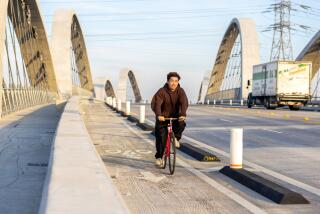Readers React: Stop driving SUVs? People won’t be persuaded by government planning and earnest editorials
- Share via
To the editor: Your editorial points out that people are driving more, not less. The reasons are obvious — we all have places to go and things to do, and time, safety and convenience are some of our most valuable commodities. Most people would not choose to share their vehicles with a sleeping homeless person, as they sometimes must do on a bus or train.
Many people enjoy living outside Los Angeles. They vote with their feet and their wallets, whether it is the transportation they choose, the place that they live, or the food that they eat. Central planning did not work in the Soviet Union, it is not working in China (given a choice, people there will buy a car when they have the money instead of riding a bike), and it will not work here.
Subsidies for electric cars have done nothing to change bestselling vehicles in the U.S., which continue to be pickup trucks and sport-utility vehicles. The government trying to regulate cannabis out of existence did not work, and it will not work with SUVs.
The market will determine where people live and what kinds of cars they buy, not the government.
Philip C. Putnam, Los Angeles
..
To the editor: The editorial decries urban sprawl and Californians’ use of gas-powered cars.
With the recent Intergovernmental Panel on Climate Change report saying we have about a decade to dramatically cut carbon emissions, the state’s so-called Sustainable Communities Strategies initiative, meant to combat urban sprawl, is woefully inadequate. New thinking is required.
Radical, immediate steps on the federal level are needed, including but not limited to outlawing the sale of new cars with internal combustion engines by 2030, and a carbon tax that ramps up over the next 10 years to incentivize people to dump their gas-powered autos.
There are many details to work out in such policies, but doing that will be easy compared with dealing with the consequences of inaction.
Bill Seibel, Glendora
Follow the Opinion section on Twitter @latimesopinion and Facebook
More to Read
A cure for the common opinion
Get thought-provoking perspectives with our weekly newsletter.
You may occasionally receive promotional content from the Los Angeles Times.









